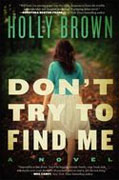Don't Try to Find Me
Holly Brown
book reviews:
· general fiction
· chick lit/romance
· sci-fi/fantasy
· graphic novels
· nonfiction
· audio books
· author interviews
· children's books @
curledupkids.com
· DVD reviews @
curledupdvd.com
newsletter
win books
buy online
links
home
for authors
& publishers
for reviewers

 |
Don't Try to Find Me Holly Brown William Morrow Hardcover 368 pages July 2014 |
|
A contemporary cautionary tale for a new generation, this novel will appeal to Young Adult audiences and parents concerned with expanding influence of the Internet and social media on impressionable teens. When fourteen-year-old Marley Willits leaves home one day, her only note a few lines scribbled on the kitchen dry erase board, her mother, Rachel, doesn’t take it seriously. Marley’s father, Paul, a man not given to wasted emotions or words, turns instead to the cold comfort of statistics and probabilities. Neither considers that Marley means what she has written (“Don’t try to find me.”) until it becomes glaringly obvious when Marley fails to return home that night.
What appears a normal family with the usual problems becomes a topic for general discussion when Paul Willits creates a Facebook page, FindMarley.com, and a Twitter account to draw attention to his missing daughter, suddenly surrounded by a throng of willing volunteers and a PR specialist to guide the Willits through press interviews and television appearances. The more tentative (guilty?), less competent Rachel is pushed to the sidelines, too frequently off message, a distraction when airtime is at a premium and Paul obviously the better spokesman. But it is Rachel who harbors a secret that will embarrass them all, a potential bombshell that will confirm suspicions—already widely discussed online—that she is a bad mother, or worse, that she has had something to do with Marley’s disappearance. The fact that Rachel keeps secrets and allows herself to grow suspicious of both Paul and Marley’s psychologist, Dr. Michael, does little to inspire confidence, including the fatuousness of her observations. Chapters from Marley’s perspective reveal not only her reason for running away but the double life she has led, giving substance to the very real fears modern parents harbor about the vulnerabilities of young girls on the Internet. Brown captures the thought processes of a fourteen-year-old girl in distress and looking for a way out of life’s inevitable dilemmas: the secret drinking, the need to hide her feelings, an inability to relate to parents and vulnerability to the online seductions of an older, more experienced male. These are legitimate fears. Unfortunately, the majority of the novel focuses on the activities of Rachel and Paul in their crisis, especially Rachel, who is particularly dense, self-centered and lacking in common sense, as though the author couldn’t decide which character she empathizes with the most: a confused mother or runaway daughter seeking validation. Nor could she choose a voice, a teenage runaway in distress or an adult woman searching to identify her part in her daughter’s extreme solution to a normal problem. What might have been a compelling drama becomes, instead, a structurally weak and fragmented novel relying more on new-speak (Facebook, Twitter, “trending” topics) than character development, none of the primary characters sufficiently fleshed out to serve as examples for contemporary parenting. Too bad. Originally published on Curled Up With A Good Book at www.curledup.com. © Luan Gaines, 2014 |
|
|
|
 Click here to learn more about this month's sponsor! |
|
| fiction · sf/f · comic books · nonfiction · audio newsletter · free book contest · buy books online review index · links · · authors & publishers reviewers |
|
| site by ELBO Computing Resources, Inc. | |
 The expected police report is made, an officer interviewing Paul and Rachel Willits, everyone in general agreement that Marley has left home of her own free will—usually a lower investigative priority for the police than a kidnapping but for Marley’s age. Frantic parental phone calls to friends ensue, but Marley isn’t a very popular girl, recently moved from the San Francisco Bay area of California to a smaller city north of their former residence. A student who hasn’t distinguished herself or made new friends, suffering the usual teenage angst common to her generation, Marley is just an ordinary, insecure fourteen-year-old who wishes she weighed less and was prettier. Only one of many friends of a popular girl when living in San Francisco, Marley’s insecurities were exacerbated by that comparison and her father’s not-so-subtle expectations of academic excellence. Little surprise, then, when Marley is unable to feel good about herself, with an always-working, well-to-do father and a mother oblivious to her daughter’s unhappiness.
The expected police report is made, an officer interviewing Paul and Rachel Willits, everyone in general agreement that Marley has left home of her own free will—usually a lower investigative priority for the police than a kidnapping but for Marley’s age. Frantic parental phone calls to friends ensue, but Marley isn’t a very popular girl, recently moved from the San Francisco Bay area of California to a smaller city north of their former residence. A student who hasn’t distinguished herself or made new friends, suffering the usual teenage angst common to her generation, Marley is just an ordinary, insecure fourteen-year-old who wishes she weighed less and was prettier. Only one of many friends of a popular girl when living in San Francisco, Marley’s insecurities were exacerbated by that comparison and her father’s not-so-subtle expectations of academic excellence. Little surprise, then, when Marley is unable to feel good about herself, with an always-working, well-to-do father and a mother oblivious to her daughter’s unhappiness.